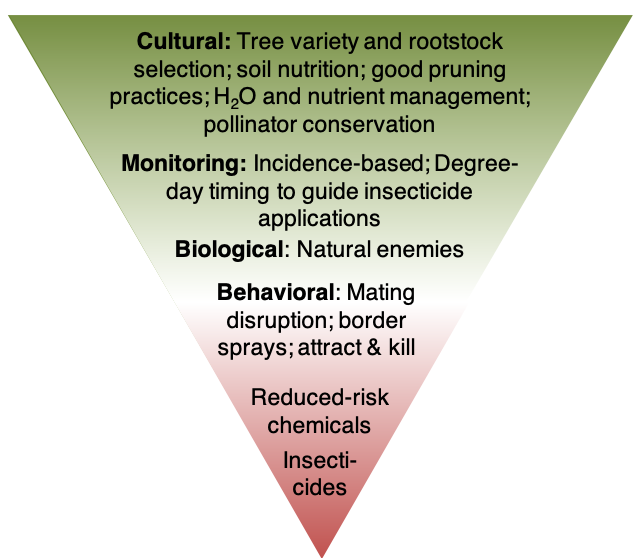By: Robert McDougall and Anne L. Nielsen
Integrated Pest Management (IPM) is the practice of using biological information to efficiently and effectively control pests while reducing reliance of pesticides. IPM is typically depicted as a pyramid of tactics that build on each other moving from least toxic at the bottom to most disruptive at the top. But in practice, IPM for insects in tree fruit relies primarily on application of synthetic insecticides guided by degree-day timing or trap counts. We want to flip the “IPM pyramid” around to emphasize that insecticides are the last tool for pest management and build upon other biologically-based practices.

By Anne Nielsen
The least disruptive means of pest control are cultural measures, those that seek to prevent pests from becoming problematic in the first place. These can include measures such as planting resistant cultivars, practicing good hygiene to prevent pest entry and maintaining diverse plantings in crop margins to encourage natural biological control agents (e.g. other insects that eat pests). In tree fruit, cultural control may include rootstock resistant to wooly apple aphid or removal and burning of pruned limbs and dying trees (for borer or scale management) which removes infested plant material and habitat for other pests.
For curative action, a central component of IPM programs depends on monitoring programs to identify pest species, occurrence and seasonality, and abundance. This is achieved primarily through direct sampling of plant tissue or baited traps. Regardless of the monitoring method, it must be conducted frequently, weekly at best. Monitoring can also establish biofix dates to start accumulating degree-days that when applied to models predict life stages of insects based on available heat units for development.
Upon identification of key pests within the orchard, the next action can take on a wide range of forms depending on the pest. This can include biological control measures, such as enhancing or introducing a natural enemy of the pest into the system in the hope of controlling it. Interactions between natural enemies and pests occur naturally within an orchard, but the strength of the interaction can be weakened through chemical insecticides and lead to outbreaks of pests, particularly aphids, mites, thrips, and scales. Implementation of reduced input or non-chemical methods can protect populations of natural enemies such as predators or parasitoids within the orchard and prevent a pest from becoming actionable. An example of a biological control program currently under investigation is controlling the Brown Marmorated Stink Bug with the Samurai Wasp, a tiny stingless Asian wasp which lays its eggs in BMSB eggs, preventing them from hatching and producing more Samurai Wasps instead of stink bugs.
The next IPM tool is behavioral management which changes the behavior of the insect so that less insecticide can be used. Insects, like other animals, have predicable behaviors, that once understood can be exploited for management. Two common approaches include altering insect behavior with pheromones (ie. mating disruption or attract-and-kill) or exploiting dispersal behaviors to apply targeted management (ie. border sprays). Mating disruption uses a species’ own sex pheromone to reduce mating within the orchard. This is accomplished by placing multiple dispensers containing pheromone throughout the orchard. This changes the behavior of male moths that are searching for females and results in fewer females laying eggs within the orchard (and cleaner fruit at harvest). For many insect species, including Oriental Fruit Moth and borers, no additional insecticide is needed (based on monitoring trap thresholds). Mating disruption for Oriental Fruit Moth in peaches can cost the same if not less than insecticide management and is highly effective. Mating disruption technology against borers is becoming increasingly necessary as further use restrictions change for Lorsban.
The behavioral tactic attract-and-kill places high doses of pheromone, usually an aggregation pheromone, on select trees to attract males and females (and sometimes nymphs) to a tree where they can then be killed with an insecticide. It is not believed to bring additional insects into the orchard, rather it brings those that are already there into one area. A second type of behavioral control is the use of border sprays. Many insects are often found in greater numbers in the edges of orchards because their dispersal is arrested due to visual cues provided by trees on the orchard edge. A border spray is usually defined as spraying the outer rows of orchard trees with insecticide. This tactic has shown to be very successful for controlling brown marmorated stink bug in peaches and apples, and reduces insecticide sprays by 25% relative to alternate row middle applications. Plum curculio also exhibits this behavior, and Rutgers is currently investigating whether it can be effectively controlled by spraying just the outer two rows of orchards during movement into the orchard.
IPM practices have evolved considerably in the past few decades and orchards are managed safer and more efficiently each year. Some of the IPM tactics described above may already be part of your orchard management practices. But as production cost increases are not instep with fruit prices, tactics that rely less on insecticide inputs will help protect orchard viability.
